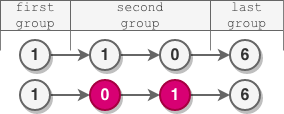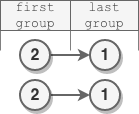Welcome to Subscribe On Youtube
Formatted question description: https://leetcode.ca/all/2074.html
2074. Reverse Nodes in Even Length Groups (Medium)
You are given the head of a linked list.
The nodes in the linked list are sequentially assigned to non-empty groups whose lengths form the sequence of the natural numbers (1, 2, 3, 4, ...). The length of a group is the number of nodes assigned to it. In other words,
- The
1stnode is assigned to the first group. - The
2ndand the3rdnodes are assigned to the second group. - The
4th,5th, and6thnodes are assigned to the third group, and so on.
Note that the length of the last group may be less than or equal to 1 + the length of the second to last group.
Reverse the nodes in each group with an even length, and return the head of the modified linked list.
Example 1:

Input: head = [5,2,6,3,9,1,7,3,8,4] Output: [5,6,2,3,9,1,4,8,3,7] Explanation: - The length of the first group is 1, which is odd, hence no reversal occurrs. - The length of the second group is 2, which is even, hence the nodes are reversed. - The length of the third group is 3, which is odd, hence no reversal occurrs. - The length of the last group is 4, which is even, hence the nodes are reversed.
Example 2:

Input: head = [1,1,0,6] Output: [1,0,1,6] Explanation: - The length of the first group is 1. No reversal occurrs. - The length of the second group is 2. The nodes are reversed. - The length of the last group is 1. No reversal occurrs.
Example 3:

Input: head = [2,1] Output: [2,1] Explanation: - The length of the first group is 1. No reversal occurrs. - The length of the last group is 1. No reversal occurrs.
Example 4:
Input: head = [8] Output: [8] Explanation: There is only one group whose length is 1. No reversal occurrs.
Constraints:
- The number of nodes in the list is in the range
[1, 105]. 0 <= Node.val <= 105
Similar Questions:
Solution 1. Two Pass
-
// OJ: https://leetcode.com/problems/reverse-nodes-in-even-length-groups/ // Time: O(N) // Space: O(1) class Solution { int getLength(ListNode *head) { int len = 0; for (; head; head = head->next) ++len; return len; } public: ListNode* reverseEvenLengthGroups(ListNode* head) { ListNode dummy, *tail = &dummy; for (int i = 0, total = getLength(head); head; ++i) { int len = min(total, i + 1); // the length of the current section ListNode *newTail = NULL; // The new tail if we need to reverse the current section for (int j = 0; j < len && head; ++j) { auto p = head; head = head->next; if (len % 2) { // direct append tail->next = p; tail = p; } else { // append in reverse order if (newTail == NULL) newTail = p; p->next = tail->next; tail->next = p; } } if (newTail) tail = newTail; tail->next = NULL; total -= len; } return dummy.next; } }; -
# Definition for singly-linked list. # class ListNode: # def __init__(self, val=0, next=None): # self.val = val # self.next = next class Solution: def reverseEvenLengthGroups(self, head: Optional[ListNode]) -> Optional[ListNode]: def reverse(head, l): prev, cur, tail = None, head, head i = 0 while cur and i < l: t = cur.next cur.next = prev prev = cur cur = t i += 1 tail.next = cur return prev n = 0 t = head while t: t = t.next n += 1 dummy = ListNode(0, head) prev = dummy l = 1 while (1 + l) * l // 2 <= n and prev: if l % 2 == 0: prev.next = reverse(prev.next, l) i = 0 while i < l and prev: prev = prev.next i += 1 l += 1 left = n - l * (l - 1) // 2 if left > 0 and left % 2 == 0: prev.next = reverse(prev.next, left) return dummy.next ############ # 2074. Reverse Nodes in Even Length Groups # https://leetcode.com/problems/reverse-nodes-in-even-length-groups/ # Definition for singly-linked list. # class ListNode: # def __init__(self, val=0, next=None): # self.val = val # self.next = next class Solution: def reverseEvenLengthGroups(self, head: Optional[ListNode]) -> Optional[ListNode]: def reverse(A, start, end): while start < end: A[start], A[end] = A[end], A[start] start += 1 end -= 1 return A A = [] curr = head length = 0 while curr: A.append(curr.val) curr = curr.next length += 1 index = count = 0 k = 1 while index < length: count += 1 if k == count: if count % 2 == 0: A = reverse(A, index - k + 1, index) count = 0 k += 1 else: if index == length - 1 and count % 2 == 0: A = reverse(A, index - count + 1, index) index += 1 res = dummy = ListNode(-1) for v in A: dummy.next = ListNode(v) dummy = dummy.next return res.next -
/** * Definition for singly-linked list. * public class ListNode { * int val; * ListNode next; * ListNode() {} * ListNode(int val) { this.val = val; } * ListNode(int val, ListNode next) { this.val = val; this.next = next; } * } */ class Solution { public ListNode reverseEvenLengthGroups(ListNode head) { int n = 0; for (ListNode t = head; t != null; t = t.next) { ++n; } ListNode dummy = new ListNode(0, head); ListNode prev = dummy; int l = 1; for (; (1 + l) * l / 2 <= n && prev != null; ++l) { if (l % 2 == 0) { ListNode node = prev.next; prev.next = reverse(node, l); } for (int i = 0; i < l && prev != null; ++i) { prev = prev.next; } } int left = n - l * (l - 1) / 2; if (left > 0 && left % 2 == 0) { ListNode node = prev.next; prev.next = reverse(node, left); } return dummy.next; } private ListNode reverse(ListNode head, int l) { ListNode prev = null; ListNode cur = head; ListNode tail = cur; int i = 0; while (cur != null && i < l) { ListNode t = cur.next; cur.next = prev; prev = cur; cur = t; ++i; } tail.next = cur; return prev; } } -
/** * Definition for singly-linked list. * class ListNode { * val: number * next: ListNode | null * constructor(val?: number, next?: ListNode | null) { * this.val = (val===undefined ? 0 : val) * this.next = (next===undefined ? null : next) * } * } */ function reverseEvenLengthGroups(head: ListNode | null): ListNode | null { let nums = []; let cur = head; while (cur) { nums.push(cur.val); cur = cur.next; } const n = nums.length; for (let i = 0, k = 1; i < n; i += k, k++) { // 最后一组, 可能出现不足 k = Math.min(n - i, k); if (!(k & 1)) { let tmp = nums.splice(i, k); tmp.reverse(); nums.splice(i, 0, ...tmp); } } cur = head; for (let num of nums) { cur.val = num; cur = cur.next; } return head; }
Discuss
https://leetcode.com/problems/reverse-nodes-in-even-length-groups/discuss/1576917/C%2B%2B-Two-Pass